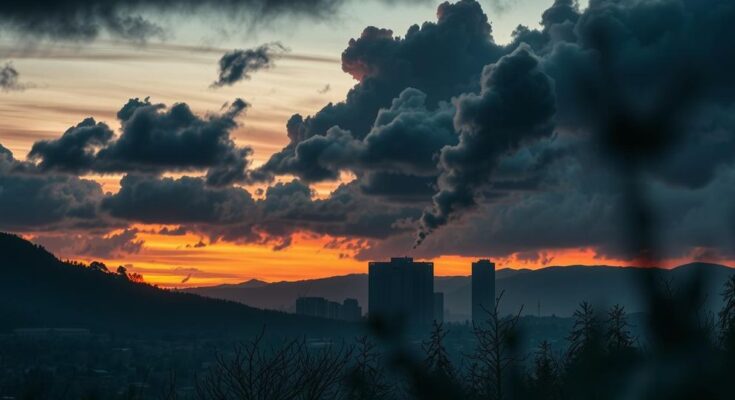M23 rebels in Congo claim to have seized Goma, prompting panic among residents and a declaration of war from the government. The situation escalates as Rwanda is accused of backing the rebels, leading to the severing of diplomatic ties. Civilians are fleeing amidst the chaos, emphasizing the ongoing humanitarian crisis in this conflict-ridden region.
Congo’s M23 rebels purportedly seized control of Goma, the largest city in eastern Congo, early Monday morning. The rebels’ advance prompted alarm among the city’s 2 million residents, resulting in what the United Nations characterized as a “mass panic.” The Congolese government condemned the situation, labeling it a “declaration of war” following the expiration of a deadline for the Congolese army to surrender weapons.
In a statement, the M23 urged Goma’s residents to stay calm and requested members of the military to gather at the central stadium. The takeover poses a severe threat to the long-stalled peace efforts within the mineral-rich region, exacerbating an already dire humanitarian crisis as more than a third of North Kivu province’s population is reportedly displaced.
As violence escalated, UN peacekeepers began facilitating the surrender of Congolese troops on the city’s outskirts. Both government and military officials called for the protection of civilians amid the burgeoning conflict that has already claimed the lives of 13 peacekeepers in recent weeks. The UN has reported that M23 fighters are advancing and exploiting civilians as human shields.
The situation worsened late Sunday as the Congolese government severed diplomatic ties with Rwanda, which stands accused of backing the M23 rebels. Although Rwanda has consistently denied such allegations, it has acknowledged its military presence in Congo under the guise of national security. Alongside escalating conflict, armed groups continue to disrupt the region, worsening the humanitarian situation.
Heavy gunfire resonated through Goma on Sunday, forcing many residents to flee towards safer areas, including Rwanda. Some citizens expressed uncertainty about their safety in the city, while UN officials warned of catastrophic consequences if violence spread to densely populated areas. Despite calls for a ceasefire from the international community, the situation appears increasingly precarious, with reports of civilian casualties and mass evacuations.
While the Congolese army, bolstered by allied forces and UN peacekeepers, attempts to repel the M23 offensive, tensions remain high. The conflict poses a significant threat to stability in the region, where historical grievances and competition for resources perpetuate cycles of violence. Residents are left with difficult choices as they grapple with the harsh realities of war.
As the security situation in Goma deteriorates, the region continues to grapple with the fallout from decades of conflict. The resilience of civilians in the face of such turmoil serves as a poignant reminder of the ongoing humanitarian crisis. The international community watches with concern as the implications of this conflict could reverberate beyond the borders of Congo.
The situation in Goma represents the culmination of a complex, long-standing conflict in eastern Congo, involving numerous armed groups vying for control in a region rich in natural resources. The M23 rebels, comprised of primarily ethnic Tutsis, have a contentious history with the Congolese state and have previously seized Goma in similar circumstances. The involvement of Rwanda, accused of providing support to the M23, adds another layer of complexity to the conflict, illustrating broader regional tensions among these nations and the ongoing humanitarian disaster for the civilian population caught in the crossfire.
The capture of Goma by M23 rebels accentuates the precarious and deteriorating security situation in eastern Congo and highlights the dire conditions faced by millions of residents. With the Congolese government severing ties with Rwanda amidst claims of support for the rebels, the potential for escalation looms large. The international community’s calls for ceasefire and increased support for humanitarian efforts remain crucial as conflict intensifies and civilian populations continue to suffer.
Original Source: www.newspressnow.com




